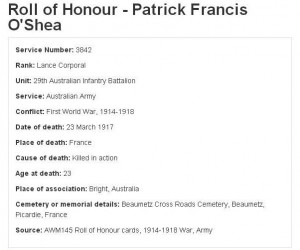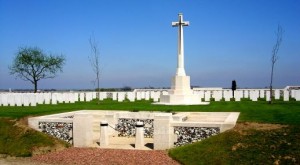WWI Stories – Patrick Francis O’Shea
Tallangatta
J.P. O’Shea shares the story of his uncle, Patrick Francis O’Shea, who was killed in action on the Western Front in March 1917.
 My uncle Patrick O’Shea was reported missing in action after a German offensive on Australian lines. He and two others were buried on the battlefield by a comrade from the 57th Battalion. By extraordinary good fortune his remains were found and identified. A burial party retrieved him and he was re-interred in the Cross Roads Military Cemetery at Beaumetz les Cambrai in France. My wife and I have visited his grave. We were the only people there and it was a beautiful autumn day – it was nice to see that the cemetery was beautifully maintained. British, Australia and New Zealand soldiers were buried there. All ranks, from Brigadier to Private. I will never forget the emotion of that day.
My uncle Patrick O’Shea was reported missing in action after a German offensive on Australian lines. He and two others were buried on the battlefield by a comrade from the 57th Battalion. By extraordinary good fortune his remains were found and identified. A burial party retrieved him and he was re-interred in the Cross Roads Military Cemetery at Beaumetz les Cambrai in France. My wife and I have visited his grave. We were the only people there and it was a beautiful autumn day – it was nice to see that the cemetery was beautifully maintained. British, Australia and New Zealand soldiers were buried there. All ranks, from Brigadier to Private. I will never forget the emotion of that day.
Patrick enlisted at Tallangatta in April 1916. A farm labourer from the Buckland Valley, he was 22 years old. Five foot, ten and three-quarter inches (we footy fans know the importance of that extra three-quarters of an inch) and of sturdy build. Basic training in was conducted in Geelong and he sailed from Melbourne for Plymouth on HMAT Commonwealth on 19 September 1916. Over to France and sent to reinforce the 29th Battalion which had suffered casualties at Fromelles that July.
Patrick was my father’s older brother by three years. My own father was old enough to enlist but did not do so. It occurs to me that Uncle Pat probably took up the family’s “duty” to contribute to the War effort, so sparing my father of any obligation. In that case I have an enormous amount of personal respect for and gratitude to him.
It really is intriguing to think about his reasons for enlisting. A thirst for adventure? Peer pressure? Patriotism? Boredom on the farm? As a young single man, he had no ties apart from his mother and siblings. The timing itself of his enlistment is interesting. He didn’t enlist in 1915 as a result of the strong recruitment campaigns following Gallipoli.
 Patrick came from strong Irish Catholic stock (although his maternal grandfather was a Jewish Miner form Yorkshire) and he enlisted at a time of huge social and religious divisions in both Irish and Australian society. The Easter Uprising of Sinn Fein as well as the polemic of Archbishop Mannix in Australia in advance of the Conscription Referenda were the forces swirling around Irish Catholics in Australia at the time of his enlistment. I wish I knew more about the way attitudes and opinions were formed and the pressures that individuals felt at the time in their own communities and in their own social/religious enclaves.
Patrick came from strong Irish Catholic stock (although his maternal grandfather was a Jewish Miner form Yorkshire) and he enlisted at a time of huge social and religious divisions in both Irish and Australian society. The Easter Uprising of Sinn Fein as well as the polemic of Archbishop Mannix in Australia in advance of the Conscription Referenda were the forces swirling around Irish Catholics in Australia at the time of his enlistment. I wish I knew more about the way attitudes and opinions were formed and the pressures that individuals felt at the time in their own communities and in their own social/religious enclaves.





